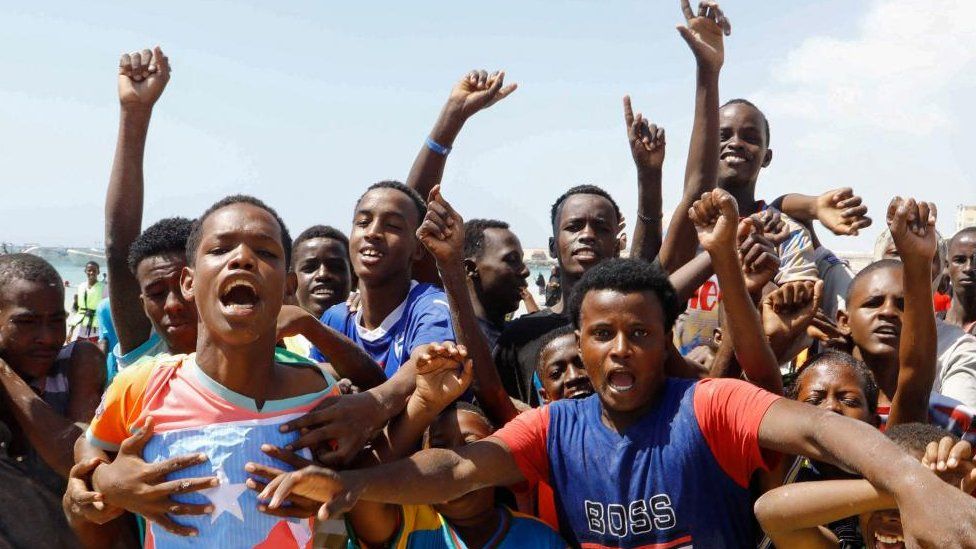Date: Wednesday, 10 January 2024
 Image source, Reuters
Image source, ReutersThe defence minister of the self-declared republic of Somaliland has become the latest casualty of the row over a controversial agreement that is causing ructions in the Horn of Africa.
Abdiqani Mohamoud Ateye resigned saying that cabinet ministers should have been consulted over a deal that Somaliland struck with Ethiopia that could see it leasing part of its coastline to its landlocked neighbour.
Somalia - which considers Somaliland to be part of its territory - reacted angrily to the 1 January deal, calling it an act of aggression.
Both the US and the African Union have backed the territorial integrity of Somalia and urged all parties to cool tensions.
The exact wording of the deal signed by the leaders of Ethiopia and Somaliland has not been made public, which is a problem as there are differing versions of what the two sides agreed in the Memorandum of Understanding (MoU).
An MoU is a statement of intent rather than a legally binding agreement but what seems clear is that Somaliland is ready to grant Ethiopia access to the sea for commercial traffic through a port, although it is not clear which port that would be.
There is also a military aspect. Somaliland has said it could lease a section of the coast to Ethiopia's navy, a detail which has been confirmed by Addis Ababa.
In return, Somaliland will get a share in Ethiopia Airlines, the country's successful national carrier.
But where things get sticky is whether Ethiopia said it would recognise Somaliland as an independent state - something which no other country has done in the 30 years since the former British protectorate said it was leaving Somalia.
On the day of the signing, Somaliland's President Muse Bihi Abdi said the agreement included a section stating that Ethiopia would recognise Somaliland as an independent country at some point in the future.
Ethiopia has not confirmed this. Instead, in its attempt to clarify what was in the MoU, the government on 3 January said the deal included "provisions… to make an in-depth assessment towards taking a position regarding the efforts of Somaliland to gain recognition".
For Somalia, Somaliland is an integral part of its territory. Any suggestion that it could make a deal with another country or that bits of it could be leased without the approval of Mogadishu is highly problematic.
The day after the MoU was signed, Somalia described the deal as an act of "aggression" that was an "impediment to… peace and stability". It also recalled its ambassador from Addis Ababa.
On Sunday, Somali President Hassan Sheikh Mohamud stepped up the rhetoric saying: "We will defend our country, we will defend it by all means necessary and seek the support of any ally willing to help us."
He also called on youths "to prepare for the defence of our country".
Last week there were protests in Mogadishu against the deal with tens of thousands turning up to express their opposition.
Somaliland, a former British protectorate, declared itself independent from Somalia in 1991 and has all the trappings of a country, including a working political system, regular elections, a police force and its own currency.
Over the decades it has also escaped much of the chaos and violence that have hit Somalia.
But its independence has not been recognised by any country.
If, as Somaliland said, Ethiopia has agreed to recognise it at some point, it would have a profound impact on the Horn of Africa region.
Prime Minister Abiy Ahmed last year described access to the sea as an existential issue.
Ethiopia lost its ports when Eritrea seceded in the early 1990s. With more than 100 million people, it is the most populous landlocked country in the world.
Mr Abiy's statement raised fears that Ethiopia could try to achieve its goal by force.
It has described the deal with Somaliland as historic, and emphasised that its intentions are peaceful.
"The position announced by the government is strongly rooted in a desire to not engage in war with anyone," Ethiopia's communications office said.
But in an oblique reference to the controversy, Mr Abiy said on X on Sunday that "if we expect things to happen in ways that we are used to or know or can predict, [opportunities] may pass us".
He added that some sometimes "out of the box" thinking was needed to achieve goals.
On 3 January, African Union commission chairperson Moussa Faki Mahamat called for calm and mutual respect "to de-escalate the simmering tension" between Ethiopia and Somalia.
US state department spokesperson Matthew Miller also said that his country was concerned by reports that Ethiopia would recognise Somaliland's independence.
"We join other partners in expressing our serious concern as well about the resulting spike in tensions in the Horn of Africa," he added in a press briefing.
Turkey, which plays a significant role in Somalia, stated its "commitment to the unity, sovereignty and territorial integrity" of Somalia.
And Egypt has also pledged support for Somalia. President Abdul Fattah al-Sisi told his Somali counterpart that Egypt stood by Somalia and supported "its security and stability".
